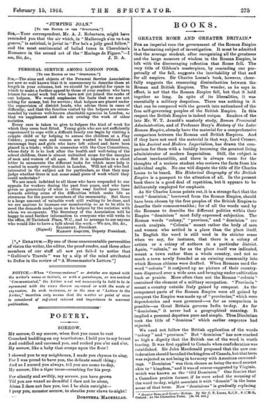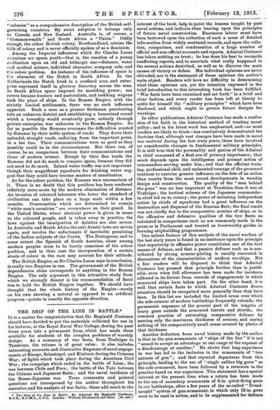BOOKS.
GREATER ROME AND GREATER BRITAIN.*
Fos an imperial race the government of the Roman Enipire is a fascinating subject of investigation. It must be admitted that the average student, after recognizing all the greatness and the large measure of wisdom in the Roman Empire, is left with the discouraging reflection that Rome fell. The very title of Gibbon's masterpiece, by reminding one per- petually of the fall, suggests the inevitability of that end' for all empires. Sir Charles Lucas's book, however, cheer- fully suggests the reassuring dissimilarities between the -•
Roman and British Empires. The wonder, as he says in effect, is not that the Roman Empire fell, but that it -held
together so long. In spite of its liberalities, it -was essentially a military despotism. There was nothing in it that can be compared with the growth into nationhood of the- free self-governing peoples of- the British Empire. In this respect the British Empire is indeed unique. Readers of the late Mr. W. T. Arnold's masterly study; Roman Provincial Administration, and of Professor Bury's .History of the Later Roman Empire, already have the material for a comprehensive comparison between the Roman and British Empires. And if they have not used the material in that way, Lord-Cromer, in his Ancient and Modern Imperialism, has drawn the com- parison for them with a lucidity becoming the greatest living administrator of modern Imperialism. Still, the subject is almost inexhaustible, and there is always room. for the thoughts of a serious student who reviews the facts from his individual angle. - No one will dispute the title of Sir Charles- Lucas to be heard. His Historical Geography of the British Empire is a passport to the attention of all. In the present book there is a good deal of repetition, but it appears to be deliberately employed for emphasis.
As Sir Charles Lucas points out, it is a strange fact that the word " dominion," borrowed from the Roman Empire, should have been chosen by the free peoples of the British Empire to describe their commonwealths ; for of all the words used by the Romans to describe the different polities within their Empire " dominium" most fully expressed subjection. The Roman words "colony," " province," and " dominion" are worth analysis. "Colonia" meant rather the body of men and women who settled in a place than the place itself. In English the word is still used in its stricter sense when we say, for instance, that there is a colony of artists or a colony of authors in a particular district. Again, " colonia," so far as the place itself was indicated, meant a town rather than a whole country, and not so much a town newly founded as en existing community into which Roman citizens were drafted. When Romans used the word " colonia " it conjured up no picture of their country- men dispersed over a wide area and bringing under cultivation bush or prairie. More often than not the Roman " colonia contained the element of a military occupation. "Provincia " meant a country outside Italy gained by conquest. As the component parts of the Roman Empire were all gained by conquest the Empire was made up of " provinciae," which were dependencies and were governed—so far as comparison is possible—as Great Britain governs India to-day. As for " dominium," it never had a geographical meaning. It implied a personal depotism pure and simple. Thus Diocletian took the title of " dominus" which earlier emperors had rejected.
We need not follow the British application of the words " colony " and " province." But " dominion" has now reached so high a dignity that the British use of the word is worth tracing. It was first applied to Canada when confederation was established. Sir John Macdonald proposed that the new con- federation should be called thekingdom of Canada, but that term was rejected as not being in harmony with American surround- ings. "Dominion " was then chosen as being the word nearest akin to " kingdom," and it was of course suggested by Virginia, which was known as the " Old Dominion." One fancies that a Canadian prairie farmer, if he were asked the meaning of the word to-day, might associate it with "domain in the loose sense of that term. Now " dominions" is gradually replacing • Greater RoCure Greater Britain. By Sir C. P. Lucas, H.C.B , Oxford : At thndon Press. [Ss. fat. net.]
"colonies" as a comprehensive description of the British self- governing countries. 'By strict adoption it belongs only to Canada and New Zealand. Australia is, of course, a "Commonwealth" and South Africa a "Union." Oddly enough, the oldest British colony, Newfoundland, retains the title of colony and is never officially spoken of as a dominion.
Among the Imperial influences which Sir Charles Lucas examines are space, youth—that is, the reaction of a young civilization upon an old and lethargic one—distance, water and medical science, individual character, company rule, and the colour problem. An instance of the influence of space is 1!:e character of the Dutch in South Africa. In the Netherlands the Dutch lived in a confined area, and enter- prise expressed itself in glorious discovery across the seas. In South Africa space imposed its moulding power ; sea rovers became hunters and pastoralists, and trekking wagons took the place of ships. In the Roman Empire, with the strictly limited settlements, there was no such influence apparent. Such a man as a pioneer Scotsman penetrating into an unknown district and establishing a homestead round which a township would eventually grow, entirely through private enterprise, was unknown to the Roman Empire. So far as possible the Romans overcame the difficulties created by distance by their noble system of roads. They drove their splendid, straight roads, radiating from the important point, in a bee line. Their communications were as good as they possibly could be in the circumstances. But there can, of course, be no comparison between their communications and those of modern science. Except by their fine roads the Romans did not do much to conquer space, because they did not need to do much. Inland water traffic was not important though their magnificent aqueducts for drinking water sug- gest that they could have become masters of canalization.
As for the colour problem, the Romans were unconscious of it. There is no doubt that this problem has been rendered infinitely more acute by the modern elimination of distance. An invasion of coloured labourers who lower the standard of civilization can take place on a large scale within a few months. Communities which are determined to remain "white men's countries " are everywhere on their guard. In the United States, where electoral power is given in name to the coloured people, and is taken away in practice, the laws against the immigration of Asiatics are also severe. In Australia and South Africa the anti-Asiatic laws are severe again, and involve the unfortunate if inevitable penalizing of the Indian subjects of the Crown. The Portuguese, and to some extent the Spanish of South America, alone among modern peoples seem to be barely conscious of the colour problem, and in their case the incorporation of a certain strain of colour in the race may account for their attitude.
The British Empire, as Sir Charles Lucas says in conclusion, is really two Empires in one. The government of the British dependencies alone corresponds to anything in the Roman Empire. The only argument in this attractive study from which we strongly dissent is his recommendation of fiscal ties to hold the British Empire together. We should have thought that the whole history of the Empire—surely on his own showing a natural as opposed to an artificial progress—points in exactly the opposite direction.











































 Previous page
Previous page